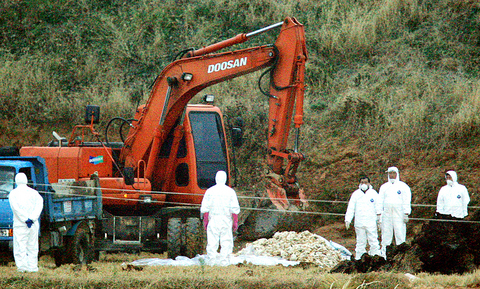South Korean quarantine officials yesterday began slaughtering more than 230,000 poultry after an outbreak of the H5N1 strain of bird flu at a chicken farm, the agriculture ministry said.
A total of 236,000 poultry within a 500m radius of the outbreak site in Iksan, about 250km south of Seoul, will be slaughtered to keep the virus from spreading, ministry official Kim Chang-sup said.
Iksan is a hub of the country's poultry industry. Health officials, backed by police and soldiers, cordoned off a 10km radius around the outbreak site.

PHOTO: AP
"We have increased quarantine activity, maintaining tight restrictions on the movement of people and vehicles there to stop the virus from spreading," spokesman Yoon Yong-do said.
Blood tests on affected birds showed the virus was the H5N1 strain, he said.
"Some 236,000 chickens within a 500 meter radius of the affected farm are being culled and buried," Yoon said, adding that ducks, pigs and dogs were also slaughtered.
He said Minister of Agriculture and Forestry Park Hong-soo chaired an emergency meeting yesterday and called for comprehensive action to tackle the outbreak in the southern city.
"We are closely monitoring the area as there are about 5 million chickens in a 10 kilometer quarantine zone, which also includes Halim," Yoon said.
Halim, the country's top chicken meat processor, supplies 20 to 25 percent of domestic needs and also exports cooked chicken to Japan and other countries.
Japan has already suspended South Korean poultry imports and started requiring people arriving from the country to disinfect their shoes.
"Blood tests on people in the area showed no one has been affected by the virus," Oh Dae-kyu, head of the National Veterinary Research and Quarantine Service, told reporters.
The outbreak occurred last week, resulting in the deaths of 6,700 infected chickens. Another 6,300 were culled.
South Korea killed 5.3 million birds during the last known outbreak of bird flu in 2003.
The H5N1 virus began ravaging Asian poultry stocks in late 2003 and has killed at least 153 people worldwide.
So far, the disease remains hard for people to catch and most human cases have been traced to contact with infected birds. Nine South Koreans were infected by the virus while helping slaughter 5.3 million ducks and chickens from December 2003 to March 2004, but they showed no symptoms of the disease as defined by the WHO.
Also last week, a low-grade strain of bird flu killed 200 chickens in a separate outbreak south of Seoul.
The Agriculture Ministry said it was not the H5N1 strain.
The WHO has warned that it could take years to eliminate the H5N1 virus. Experts say avian flu has entrenched itself in much of Asia and is unlikely to disappear anytime soon.

INVESTIGATION: The case is the latest instance of a DPP figure being implicated in an espionage network accused of allegedly leaking information to Chinese intelligence Democratic Progressive Party (DPP) member Ho Jen-chieh (何仁傑) was detained and held incommunicado yesterday on suspicion of spying for China during his tenure as assistant to then-minister of foreign affairs Joseph Wu (吳釗燮). The Taipei District Prosecutors’ Office said Ho was implicated during its investigation into alleged spying activities by former Presidential Office consultant Wu Shang-yu (吳尚雨). Prosecutors said there is reason to believe Ho breached the National Security Act (國家安全法) by leaking classified Ministry of Foreign Affairs information to Chinese intelligence. Following interrogation, prosecutors petitioned the Taipei District Court to detain Ho, citing concerns over potential collusion or tampering of evidence. The

Seventy percent of middle and elementary schools now conduct English classes entirely in English, the Ministry of Education said, as it encourages schools nationwide to adopt this practice Minister of Education (MOE) Cheng Ying-yao (鄭英耀) is scheduled to present a report on the government’s bilingual education policy to the Legislative Yuan’s Education and Culture Committee today. The report would outline strategies aimed at expanding access to education, reducing regional disparities and improving talent cultivation. Implementation of bilingual education policies has varied across local governments, occasionally drawing public criticism. For example, some schools have required teachers of non-English subjects to pass English proficiency

‘FORM OF PROTEST’: The German Institute Taipei said it was ‘shocked’ to see Nazi symbolism used in connection with political aims as it condemned the incident Sung Chien-liang (宋建樑), who led efforts to recall Democratic Progressive Party (DPP) Legislator Lee Kun-cheng (李坤城), was released on bail of NT$80,000 yesterday amid an outcry over a Nazi armband he wore to questioning the night before. Sung arrived at the New Taipei City District Prosecutors’ Office for questioning in a recall petition forgery case on Tuesday night wearing a red armband bearing a swastika, carrying a copy of Adolf Hitler’s Mein Kampf and giving a Nazi salute. Sung left the building at 1:15am without the armband and apparently covering the book with a coat. This is a serious international scandal and Chinese

NEGOTIATIONS: The US response to the countermeasures and plans Taiwan presented has been positive, including boosting procurement and investment, the president said Taiwan is included in the first group for trade negotiations with the US, President William Lai (賴清德) said yesterday, as he seeks to shield Taiwanese exporters from a 32 percent tariff. In Washington, US Trade Representative Jamieson Greer said in an interview on Fox News on Thursday that he would speak to his Taiwanese and Israeli counterparts yesterday about tariffs after holding a long discussion with the Vietnamese earlier. US President Donald Trump on Wednesday postponed punishing levies on multiple trade partners, including Taiwan, for three months after trillions of US dollars were wiped off global markets. He has maintained a 10 percent